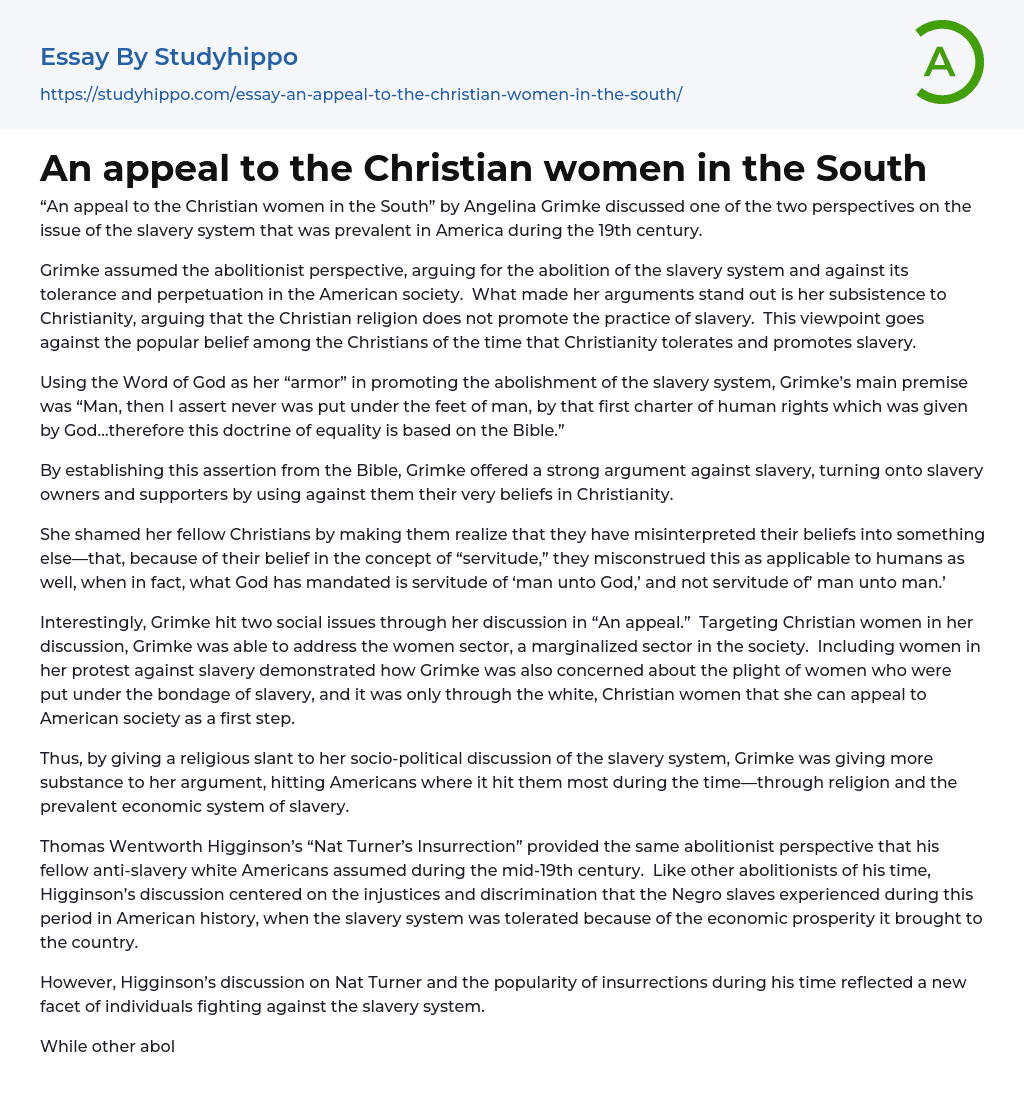

An appeal to the Christian women in the South Essay Example
“An appeal to the Christian women in the South” by Angelina Grimke discussed one of the two perspectives on the issue of the slavery system that was prevalent in America during the 19th century.
Grimke assumed the abolitionist perspective, arguing for the abolition of the slavery system and against its tolerance and perpetuation in the American society. What made her arguments stand out is her subsistence to Christianity, arguing that the Christian religion does not promote the practice of slavery. This viewpoint goes against the popular belief among the Christians of the time that Christianity tolerates and promotes slavery.
Using the Word of God as her “armor” in promoting the abolishment of the slavery system, Grimke’s main premise was “Man, then I assert never was put under the feet of man, by tha
...t first charter of human rights which was given by God…therefore this doctrine of equality is based on the Bible.”
By establishing this assertion from the Bible, Grimke offered a strong argument against slavery, turning onto slavery owners and supporters by using against them their very beliefs in Christianity.
She shamed her fellow Christians by making them realize that they have misinterpreted their beliefs into something else—that, because of their belief in the concept of “servitude,” they misconstrued this as applicable to humans as well, when in fact, what God has mandated is servitude of ‘man unto God,’ and not servitude of’ man unto man.’
Interestingly, Grimke hit two social issues through her discussion in “An appeal.” Targeting Christian women in her discussion, Grimke was able to address the women sector, a marginalized secto
in the society. Including women in her protest against slavery demonstrated how Grimke was also concerned about the plight of women who were put under the bondage of slavery, and it was only through the white, Christian women that she can appeal to American society as a first step.
Thus, by giving a religious slant to her socio-political discussion of the slavery system, Grimke was giving more substance to her argument, hitting Americans where it hit them most during the time—through religion and the prevalent economic system of slavery.
Thomas Wentworth Higginson’s “Nat Turner’s Insurrection” provided the same abolitionist perspective that his fellow anti-slavery white Americans assumed during the mid-19th century. Like other abolitionists of his time, Higginson’s discussion centered on the injustices and discrimination that the Negro slaves experienced during this period in American history, when the slavery system was tolerated because of the economic prosperity it brought to the country.
However, Higginson’s discussion on Nat Turner and the popularity of insurrections during his time reflected a new facet of individuals fighting against the slavery system.
While other abolitionists argued either by discussing the social issue of slavery itself or by confronting the Christian foundations of the slavery system or both, Higginson’s discussion centered on the violence that became inevitable when slaves decided to avenge against the injustices they experienced through insurrections.
Using the example of Nat Turner, a slave who led numerous insurrections against white Americans, Higginson pointed out why insurrection became a necessity, as slavery became rampant and the American economy became dependent on it for continued growth.
Although Higginson cited the violence that comes with
insurrection, he rationalized on the act of insurrection itself, arguing that in insurrection, Negro slaves “…were humaner than Indians; or than white men fighting against Indians: there was no gratuitous outrage beyond the death-blow itself, no insult, no mutilation…” In this passage, Higginson acknowledged the violence that came with insurrections; however, he also argued that insurrections are necessary for slaves to achieve the abolishment of slavery.
Like other abolitionists who strongly believed in Christianity, Higginson ‘glorified’ the slaves who, despite their anger at the injustices the white American society had inflicted them, they were more humane: they killed only for the sake of killing their oppressors, and did not commit any “charge of an indecent outrage on a woman,” an outcome that was guided, according to the author, to Nat Turner’s leadership.
Higginson’s story tells readers of the history, glory, and humanity that prevailed even during the highest point of persecution against slaves and abolitionists, serving as the catalyst towards the slaves’ attainment of freedom and equality.
- Baptism essays
- Holy Spirit essays
- Jesus Christ essays
- Adam And Eve essays
- Crucifixion Of Jesus essays
- Crusades essays
- Eucharist essays
- God The Father essays
- Pope essays
- Protestantism essays
- Christian essays
- Church essays
- Elizabeth essays
- Sacrament essays
- Catholic Church essays
- Lord essays
- Priest essays
- Protestant Reformation essays
- Slave Trade essays
- Abolitionism essays
- Adam Smith essays
- American History essays
- American Revolution essays
- Ancient Egypt essays
- Articles Of Confederation essays
- Atlantic Slave Trade essays
- Aztec essays
- Benjamin Franklin essays
- Civil Rights Act of 1964 essays
- Civil Rights Movement essays
- Civil war essays
- Cleopatra essays
- French And Indian War essays
- Gettysburg essays
- Great Depression essays
- Hurricane Katrina essays
- Industrial Revolution essays
- Jamestown essays
- Manifest Destiny essays
- Mccarthyism essays
- Patrick Henry essays
- Pearl Harbor essays
- Pocahontas essays
- Prohibition essays
- Pyramids essays
- Salem Witch Trials essays
- Slavery essays
- The New Deal essays
- Thirteen Colonies essays
- Westward Expansion essays



